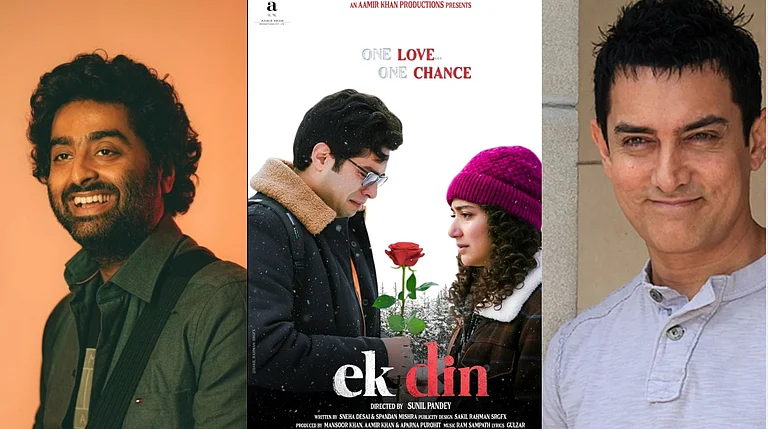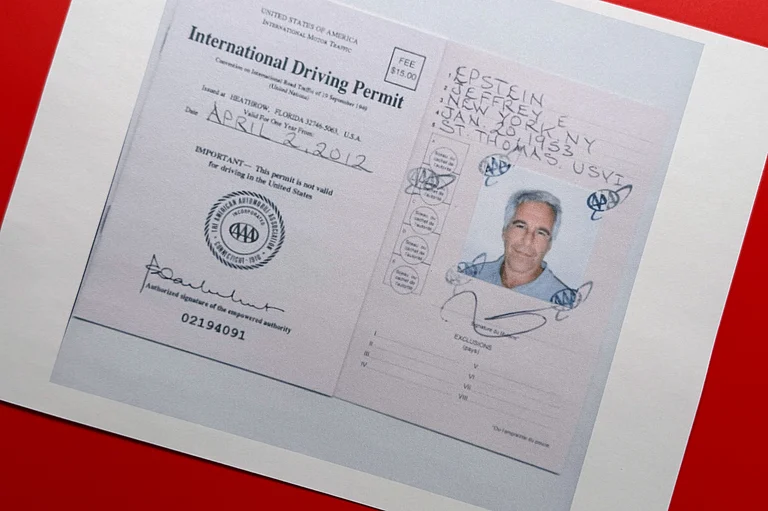DID you think that in the late 20th century, an age stupefied by tec-hno-entertainment and bursting with cyber-information, The Book, was dead? Not so. In the '90s hyper-market, books are hotter than ever. They are a high prestige commodity to be haggled over in glittering international shopping malls, with accompanying media hysteria. They are a materialist society's dream come true: just a few years of dedicated Muse-chasing and hey, there's suddenly a pot of unending gold at the bottom of every bookshelf.
Who cares if you've never read The Moor's Last Sigh by Salman Rushdie or if Vikram Seth's A Suitable Boy is too fat to balance in bed at night? The important thing is to purchase these icons of taste and discernment at whatever price and have them adorn the potted plant next to the Husain painting, overlooking the Ganesh Pyne, lending a splash of colour to the Shyam Ahuja dhurrie. The latest victim of the intelligentsia's ignoble obsession with The Book is Arundhati Roy and her as yet to be released novel, The God of Small Things.
In the midst of feverish speculation about Roy and her golden book, worth by all accounts half a million pound sterling, Pankaj Mishra, formerly editor with HarperCollins, India—who reportedly first put her in touch with her English agent, David Godwin—fell out with his employers. Subsequently, Roy withdrew her book from HarperCollins India although she specifies that she has not withdrawn it from HarperCollins, UK. Ironically, therefore, the great Indian book of the year, is, at the moment, without an Indian publisher.
In fact, The God Of Small Things got caught in the crossfire that has been raging bet-ween Rupa & Co and HarperCollins. Last month a two-member team from HarperCollins, including Adrian Laing, son of the famous R.D. Laing, visited India to look into the accounts of HarperCollins, India. Roy said she would rather not comment when asked about why she withdrew the manuscript.
"I do understand the inordinate interest the press has displayed in the amount of money that I have received as advances against royalties for my book," she says. "The reason I'm unhappy about the publicity regarding the money is that I really don't believe that money is the yardstick by which literature ought to be judged. Plenty of bad books earn huge amounts and plenty of good ones earn nothing at all." Roy says she's trying to protect her book now because it has become loaded with so much extraneous publicity. "The real compliment for me," she says, " is not the sum of money but the fact that its being translated into 12 languages and seems to have broken through cultural barriers."The book has reportedly received a tremendous response in countries like Norway, Denmark and even Finland. "As for comparisons between The God of Small Things and A Suitable Boy—how are people who haven't read my book in any position to make comparisons?" Roy demands.
Arundhati Roy is no stranger to controversy. She wrote passionately on The Great Indian Rape Trick as a reaction to the film Bandit Queen which Roy saw as a distortion and exploitation of the trials of Phoolan Devi. After a contentious exchange with Channel 4 commissioning editor Farrukh Dhondy and a well-publicised court case, the controversy subsided but Roy received a great deal of good and bad publicity. Now once again the glamorous scriptwriter of films like Electric Moon and In Which Annie Gives It Those Ones finds herself at the centre of a media storm about her role as yet another Indian author who has packaged the Indian experience for huge international profits. Yet Alok Rai, professor of English at the Indian Institute of Technology, Delhi, says that there is absolutely no question about The God of Small Things "packaging India" for the West. "It's not an Indian novel in that sense. It is after bigger game. It doesn't package India at all, such suspicions are completely beside the point as far as this book is concerned." Agrees Peter Strauss of Picador who has written that the book is different from anything that has come out of India, and it has a universality that has little to do with its setting.
But Roy is still upset by the fact that there is a lot of disinformation being spread about the manner in which her book was sold. Says she: "People don't seem to know what the role of a literary agent is, or what a literary auction is." Indeed, nowadays no book sells without an agent. Books that don't have an agent are referred to as being on the "slush pile". In fact, it was Roy who actually stopped the auction in England, saying OK, that's enough, no more bidding. In America, there was no auction but she settled for $125,000 less than the original offer because she liked the publisher Random House better. In every country she chose literary publishers over commercial ones.
Today literary auctions are a fairly routine way in which books, which more than one publisher wants, are sold; there is nothing suspect about them. Yet, in India, literary windfalls—big money from offerings to the goddess of learning—are still seen as somehow a little immoral, even wrong. Works of literature are, according to conventional wisdom, sacrosanct, not to be sullied by filthy lucre. "I'm very unhappy about reports that have appeared implying that I'm some sort of mercenary who's been hawking my book to the highest bidder. Why don't people understand that if a good publisher publishes the book, it's good for the book, it doesn't matter what you get in advance." After all, a number of Indian authors from Salman Rushdie to Amitav Ghosh are all big earners abroad, although the amount of money Roy has received for a first book, is, by all accounts, phenomenal. The UK rights alone were sold for £150,000 and the rights for the US, Italy and Germany for £100,000.
Shomit Mitter, author and close friend of Roy, says the book is remarkable for its innovative use of language. "It uses language in a way that is rare...very rarely do you get someone who can tear apart the rules and give you something that is fresh and not pretentious." According to Mitter, the book combines technical wizardry and compassion and is about two children growing up in Kerala.
"It goes without saying that I really was not expecting anything like this," says Roy. But she is reluctant to talk about the book. "It took me more than four years to write it, I can't sum it up in a few sentences without sounding absurd."
Alok Rai was the second person to have read the book. Says he:"No work of quality ever really reduces itself to a 'story'. But if there is a story, then it is about a day in the life of two children, a day which has a decisive influence on them. In that sense it is a growing up book." He agrees that the book is characterised by an innovative use of language. "It takes language seriously, in the literary sense. The language is passionate, precise and intense. Nor is it a 'woman's novel' in the recognisable way. There are some strong women in it, but there are strong men as well. After all, it is the God of Small Things who is the central character, not the goddess."


























